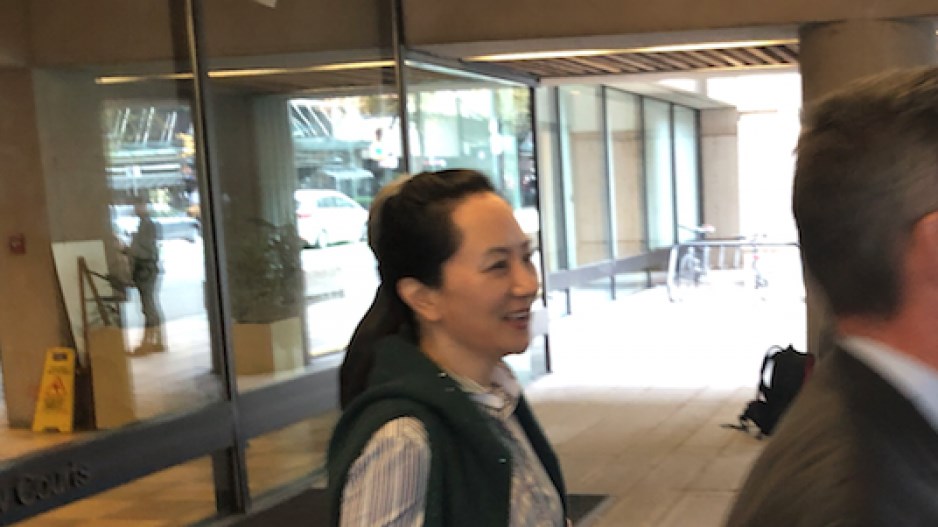One of the two RCMP officers who handled the arrest of Huawei Technologies Co. Ltd. CFO Meng Wanzhou on Dec. 1, 2018 did not read the warrant – and the included provision for immediate arrest - issued by a B.C. Supreme Court judge, the court heard Monday.
The Meng extradition hearings continued this week in Vancouver, with Crown counsel and defence lawyers questioning the testimony of a sixth witness, RCMP Const. Gurvinder Dhaliwal, in the high-profile case.
Under the cross-examination of defence lawyer Scott Fenton, Dhaliwal admitted he did not read the warrant and the details contained within, including the provision that the Huawei executive be arrested immediately.
“Did you not think it was incumbent on you to read the warrant issued by a B.C. Supreme Court judge?” Fenton questioned Dhaliwal while pursuing the topic of whether another arrest method for Meng was considered on the day of the arrest.
“On the day of, I was doing something else [in dealing with the case],” Dhaliwal said, referring to Nov. 30 – the day before the arrest where Dhaliwal and fellow officer Winston Yep received the U.S. extradition request from the Canadian Department of Justice, then securing the warrant. “Winston Yep was responsible for that task.”
Dhaliwal also said he did not take additional step to ensure the information contained in the extradition request that was used to acquire the warrant was accurate, adding that he was unaware the Meng had houses in Vancouver – as the RCMP officer “wasn’t really listening” when Yep met with the Canada Border Services Agency on the evening of Nov. 30 to discuss whether Meng was on the flight from Hong Kong scheduled for arrival the next day.
Fenton suggested that both other RCMP officers and the CBSA have suggested alternative methods of arresting Meng that would better fit the description of immediate arrest, one where the Huawei executive were to be arrested on the jetway, another where all passengers except Meng would be let off the plane – thus allowing the authorities to detain her onboard.
Dhaliwal said he did not recall such suggestions, adding that he feels the RCMP obeyed the arrest warrant’s condition of “immediate arrest,” since in this context it means “as soon as Meng is available to the RCMP for its processes.” That means waiting until the CBSA adjourned its secondary border inspection of Meng – which took about three hours after she arrived in Vancouver.
“Were you alarmed that the provision for immediate arrest wasn’t being followed?” Fenton asked.
“Meng was arrested – after the CBSA finished its process,” Dhaliwal said.
On Monday morning, Dhaliwal reiterated that he did not receive any request from the Canadian Department of Justice or U.S. authorities to obtain Meng’s passcodes for her electronic devices. He also did not receive any request to search the content of the devices, he told the court.
Dhaliwal also dismissed the idea that the meetings before the arrest – on Nov. 30 and Dec. 1 – were in any way used to conspire to seize Meng’s devices without reading her charter rights (as required with an arrest warrant).
“It was brainstorming,” Dhaliwal told the court under the questioning of Crown attorney John Gibb-Carsley. “Nothing was set in stone.”
The purpose of the meetings, Dhaliwal added, was for the RCMP to understand what the Canada Border Services Agency needed to do on their front when Meng arrives. Dhaliwal noted the he was unaware Meng had two houses in Vancouver and was planning on entering Canada, adding that the authorities were discussing what the process would be for Meng to be questioned if she were only to be travelling in-transit onto a third destination.
“Not one agency ordered the other on what to do,” Dhaliwal said. “The CBSA was clear that they will do what they needed to do first.”
The Meng defence has been consistent that the three-hour CBSA check was used improperly to help RCMP and U.S. authorities obtain devices and passcodes without reading Meng her charter rights. The defence also targetted the fact that CBSA officer Scott Kirkland wrote down the passcodes on a piece of paper during secondary inspection – a document which was then passed on to the RCMP.
Kirkland previously testified in this case that the notes were for the CBSA’s own use (for possibly examining Meng’s devices in the future for border admissibility purposes), and the RCMP obtaining it was a mistake that should not have happened.
The court hearings continue Tuesday.




